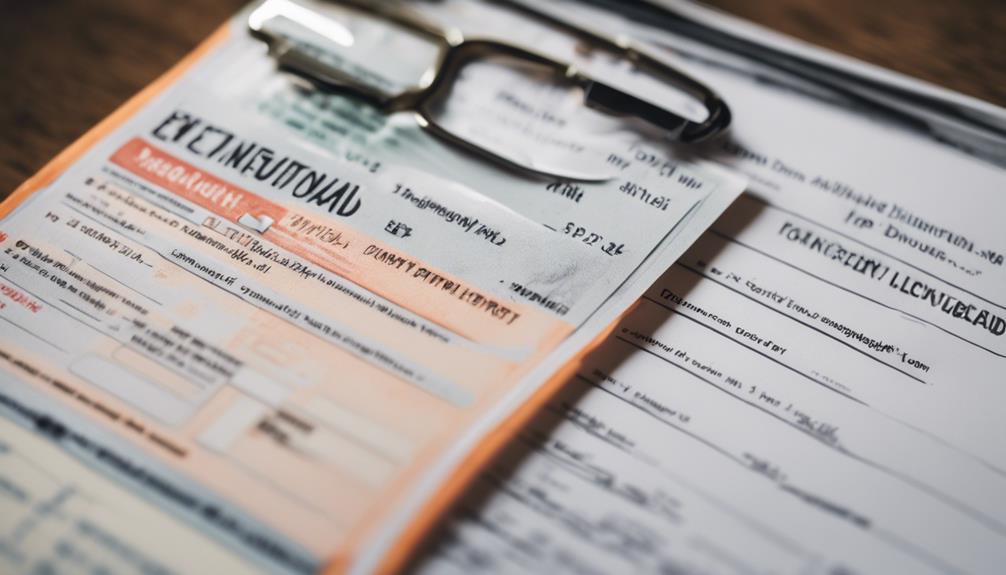Determining eligibility for Emergency Medicaid involves meeting residency, citizenship, income, and medical condition requirements. Residency criteria necessitate proof of address and continuous presence in the state. Citizenship status alignment with state guidelines is crucial, verified through documentation. Adherence to state-specific income limits, often linked to the Federal Poverty Level, is necessary. The presence of an emergency medical condition, defined by specific criteria, is pivotal. Documentation such as proof of identity, residency, income, and medical emergency is required. Successfully meeting these criteria determines Emergency Medicaid eligibility. Further details on application process and coverage period are available in the guidelines.
Residency Requirements

To qualify for Emergency Medicaid, individuals must meet specific residency requirements established by the state authorities. Proof of address is a crucial factor in determining eligibility for Emergency Medicaid. Applicants are typically required to provide documents such as utility bills, lease agreements, or official government correspondence to demonstrate their residency within the state. This proof of address helps verify that the individual meets the residency requirements set forth by the state for accessing Emergency Medicaid benefits.
Another key aspect of residency requirements is the duration of stay in the state. Individuals must have resided in the state for a specified period to be considered eligible for Emergency Medicaid. This duration of stay requirement varies depending on the state's regulations. It is essential for applicants to provide evidence of their continuous presence in the state for the required timeframe to fulfill this aspect of the residency requirements.
Citizenship Status
Eligibility for Emergency Medicaid also hinges on the applicant's citizenship status, which must align with the criteria established by the state authorities. To qualify for Emergency Medicaid, individuals must have a legal status that meets the state's eligibility requirements. Proof of citizenship or eligible immigration status is crucial for verification. Applicants are typically required to provide documentation such as a birth certificate, passport, or permanent resident card to confirm their citizenship status. In cases where an individual's citizenship status is unclear, additional steps for verification may be necessary, such as contacting relevant government agencies for confirmation.
State Medicaid programs have specific guidelines regarding the acceptable forms of proof of citizenship or eligible immigration status. It is essential for applicants to carefully review these requirements and ensure that they provide the necessary documentation to support their eligibility. Failure to provide adequate proof of citizenship or legal status may result in the denial of Emergency Medicaid benefits. Therefore, understanding and meeting the citizenship verification requirements is a critical aspect of determining eligibility for Emergency Medicaid.
Income Limits

Applicants seeking Emergency Medicaid must adhere to specific income limits set by state Medicaid programs to determine eligibility. These income limits vary from state to state and are typically based on the Federal Poverty Level (FPL). Individuals must fall within a certain percentage of the FPL to qualify for Emergency Medicaid coverage.
In addition to income limits, asset evaluation is also a crucial factor in determining eligibility for Emergency Medicaid. Applicants must disclose their financial resources, including savings, investments, and property. State Medicaid programs consider both income and assets to assess an individual's financial situation comprehensively.
Financial resources play a significant role in determining eligibility for Emergency Medicaid as they provide insight into an individual's ability to cover medical expenses. Applicants with limited financial resources are more likely to meet the income thresholds set by state Medicaid programs, thus increasing their chances of qualifying for Emergency Medicaid coverage during a medical crisis.
Emergency Medical Condition
During a medical crisis, what specific criteria define an emergency medical condition for individuals seeking Emergency Medicaid coverage? Emergency Medicaid eligibility is primarily based on the presence of an emergency medical condition. This condition must meet specific medical criteria and qualifying conditions to qualify for coverage.
An emergency medical condition is typically defined as a medical condition manifesting itself by acute symptoms of sufficient severity, including severe pain, that the absence of immediate medical attention could reasonably be expected to result in serious jeopardy to the individual's health.
In the context of Emergency Medicaid, individuals with emergency medical conditions may seek coverage for hospital admissions, urgent care access, and other necessary medical services related to the acute condition. It is crucial for individuals to understand the distinction between emergency and non-emergency medical conditions to ensure appropriate utilization of Emergency Medicaid benefits.
Documentation Needed

The documentation required for Emergency Medicaid typically includes proof of identity, residency, income, and the medical emergency itself. Valid identification such as a driver's license, passport, or state-issued ID is commonly needed to establish the identity of the individual applying for Emergency Medicaid. Residency can be confirmed through documents like utility bills or a lease agreement. Proof of income, which is crucial for determining eligibility, can include recent pay stubs, tax returns, or a letter from an employer.
Moreover, medical records play a vital role in the application process for Emergency Medicaid. These records should clearly detail the medical emergency that necessitates immediate care. They should include information on the diagnosis, treatment plan, and prognosis.
Medical records provide the necessary evidence to support the need for emergency medical assistance and ensure that the application is processed promptly. Ensuring that all required documentation is complete and accurate can significantly expedite the eligibility determination process for Emergency Medicaid.
Application Process
Upon meeting the necessary documentation requirements, individuals can initiate the application process for Emergency Medicaid by submitting a formal request for consideration. The application submission typically involves filling out a specific form provided by the Medicaid office or online platform.
Once the application is received, the processing time can vary, but it usually takes a few weeks for the Medicaid office to review the submitted information.
During the review process, the eligibility criteria are carefully assessed to determine if the individual meets the requirements for Emergency Medicaid coverage. This review includes verifying the applicant's income level, citizenship status, residency, and medical emergency situation that necessitates immediate care.
The approval process involves a comprehensive evaluation to ensure that the applicant qualifies for the emergency medical services covered under Emergency Medicaid.
It is essential for applicants to provide accurate and complete information to expedite the application process and increase the chances of approval within a reasonable time frame.
Coverage Period

The coverage period for Emergency Medicaid commences upon approval of the application and extends for a specified duration based on the individual's medical emergency situation. The coverage duration for Emergency Medicaid typically lasts until the individual's medical condition stabilizes or the emergency is resolved. The eligibility criteria for the coverage period usually require that the individual's medical emergency is severe and requires immediate attention to prevent serious harm to their health.
If the medical emergency persists beyond the initial coverage period, individuals may be eligible for a renewal process. The renewal process for Emergency Medicaid involves reassessing the individual's medical condition to determine if the emergency situation still exists and if continued coverage is necessary. This process ensures that individuals receive the necessary medical care for the duration of their emergency.
Conclusion
In conclusion, determining eligibility for emergency Medicaid involves meeting residency requirements, proving citizenship status, adhering to income limits, and demonstrating an emergency medical condition. Proper documentation must be submitted during the application process to ensure coverage.
By carefully following these guidelines, individuals in need of emergency medical care can access the necessary assistance through the Medicaid program.
